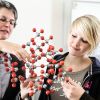A minister on an educational trip
Khin San Yee, Myanmar’s Minister of Education and a former DAAD scholarship holder, is on the lookout for reform ideas in Germany.

She’d so much like to practise her German, says Khin San Yee, speaking this morning in Berlin. Over the years it’s got a bit rusty, she concedes. Wherever her visit takes her in Germany, people automatically speak to her in English. This internationality, this casualness in dealing with others is something new, says the guest from Myanmar.
It’s some 20 years since Khin San Yee lived in Germany herself. In the 1980s, and again in the 1990s, the development economist spent time in Göttingen, working on her PhD. The reason for her returning briefly in the summer of 2014 has to do with her confidence that something else has not changed: Germany’s pioneering role in the field of education. Khin San Yee wants to find out how the system works, how schools, universities and research institutions are structured.
Since February 2014, the 59-year-old has been Myanmar’s Minister of Education. She is a member of President Thein Sein’s government. Politics is new to Khin San Yee: before being appointed a member of government – initially, Deputy Minister of National Planning and Economic Development – she taught for more than 30 years at the University of Yangon. Even today, she doesn’t regard herself as a politician, says the petite, resolute woman. She is an architect of change, she explains, someone who wants to help build her country.
And she has fairly precise ideas about what changes need to be made. Still, she immediately accepted the invitation from the German Academic Exchange Service (DAAD) to visit her former workplace and take a look around. A sort of “educational trip” across Germany is what the DAAD has organised for its former scholarship holder – including talks at universities and universities of applied sciences in Cologne, Berlin and Kaiserslautern as well as at the Federal Ministry of Education and Research (BMBF) and the Alexander von Humboldt Foundation.
Khin San Yee wants to know all the details. How is research funded in Germany? Who is responsible for what? How are universities organised internally? Of particular interest to the minister is the German Rectors’ Conference (HRK). She wants to create a similar institution in Myanmar – to give back to the universities the autonomy that was taken from them when military rule began some 50 years ago. At her own university in Yangon, one of the most important in the country, there is not a single body that is able to take its own decisions, she points out. That, she believes, needs to change urgently. “Higher education should be back in the hands of the rectors.”
On her trip, the minister is accompanied by two higher education officials from Myanmar: Maung Thynn, Rector of the University of Mandalay, and Tin Maung Tun, Pro-Rector of Sittwe University. It’s a reunion for them as well: they too once completed their PhDs in Germany with financial support from the DAAD. Khin San Yee hopes they will serve as opinion leaders, winning over their colleagues in Myanmar to the ideas the delegation brings back from its trip to Germany. Rebuilding the country’s education system will not be easy. The country lacks infrastructure – and sometimes perhaps confidence in its ability to master the necessary reforms. Architect of change, motivator, role model – Khin San Yee has to take on many roles these days.
The woman who over the past decades repeatedly managed to convince international scholars to visit her university despite Myanmar’s isolation would also like to bring about a stronger internationalisation of her country’s universities. “Exchange will be extremely important for us in the future,” she says.
Here, the DAAD remains a key partner. It was the only organisation outside Asia to provide support in the form of scholarships to students and academics in Myanmar, even during the military dictatorship, thus creating a network of well-trained alumni. As part of its sur-place and third country scholarship programmes and with funding from the Federal Ministry for Economic Cooperation and Development (BMZ), the DAAD also offers scholarships for postgraduate studies at centres of excellence in South-East Asia. In addition, two DAAD lecturers teach at universities in Myanmar and provide information on Germany as a place to study.
On her last evening in Berlin, Khin San Yee meets with DAAD scholarship holders from Myanmar. They are doing research in Germany and writing their PhD theses, just as the minister did many years ago. What advice does she have for these young people? The importance of openness to the rest of the world, says Khin San Yee. In her view, that by no means excludes loving one’s own country. She herself must now get back there quickly. There’s plenty to do. ▪
Khin San Yee
In 1987, the now 59-year-old arrived in Göttingen to study for a PhD in development economics on a German Academic Exchange Service (DAAD) scholarship. In 1991, Myanmar’s government ordered all scholarship holders to return home because of the sanctions Europe was imposing on the country. The DAAD later sought out the young researchers from Myanmar who had been forced to cut short their stays in Germany. Khin San Yee was able to resume her scholarship, completing her PhD in Göttingen in 1996. She taught for many years at the University of Yangon before entering politics in 2012.

